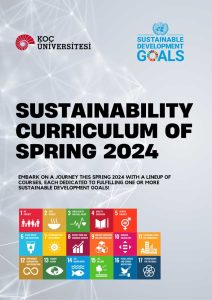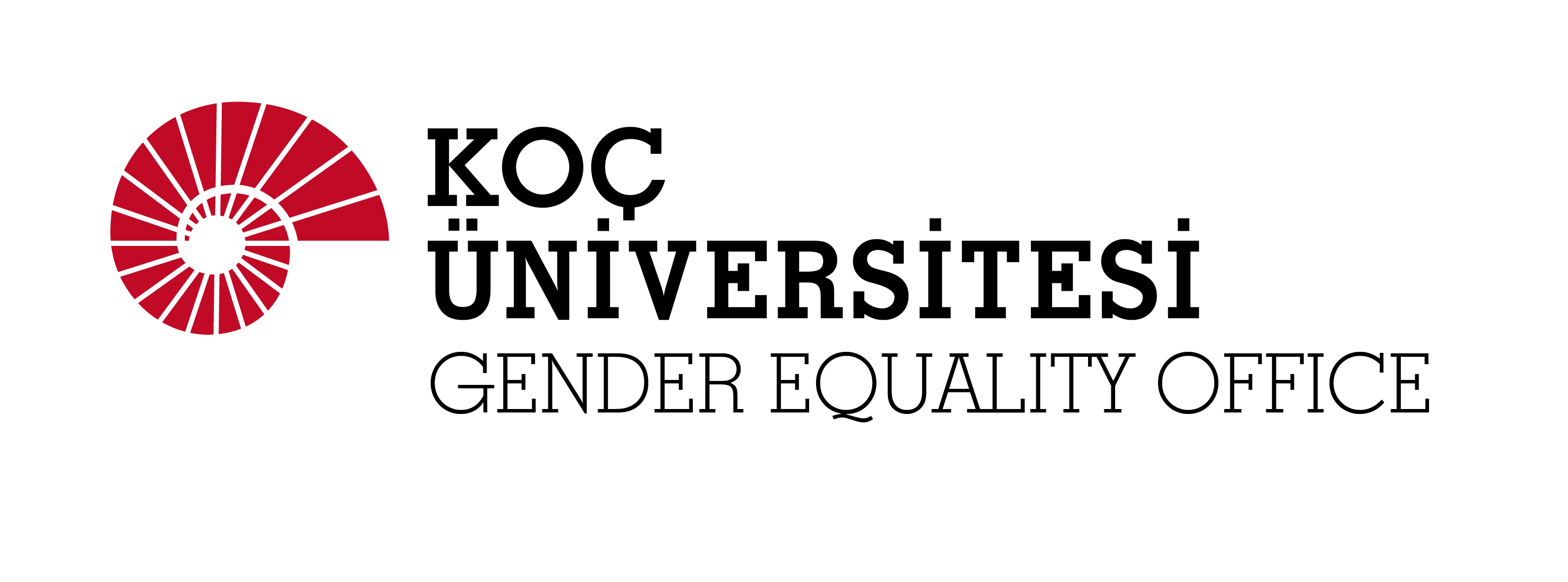 The Gender Equality Office presents the ‘Sustainability Curriculum’ poster series for Spring 2024, an extensive compilation reflecting Koç University’s steadfast commitment to fostering sustainability education across a broad spectrum of academic disciplines.
The Gender Equality Office presents the ‘Sustainability Curriculum’ poster series for Spring 2024, an extensive compilation reflecting Koç University’s steadfast commitment to fostering sustainability education across a broad spectrum of academic disciplines.
It serves as a testament to sustainability’s profound transdisciplinary nature, showcasing how universities play a critical role in fostering creative knowledge generation and skill development to confront the multifaceted challenges of sustainability.
By highlighting courses that delve into pivotal themes such as climate change mitigation, sustainable agriculture, and social justice, the series underscores the importance of enabling future generations to engage in the ongoing fight for a sustainable world. Moreover, the posters aim to illustrate the intricate overlap and intersectionality of sustainable development goals, recognizing the increasingly complex nature of global challenges that necessitate interdisciplinary collaboration for meaningful progress.
In crafting this series, the Gender Equality Office seeks to underscore the vital role of gender equality as a fundamental and cross-cutting goal that intersects with and complements broader sustainability initiatives, thereby contributing to a more inclusive and equitable sustainability framework.
Through this comprehensive exhibition, we extend a humble invitation to all members of the campus community to partake in meaningful discourse, introspection, and collective action as we endeavor to forge a sustainable future grounded in knowledge, empathy, and academic rigor.

SCIE 102 / Introduction to Ecology
Introduction to the science of ecology including the physical, chemical and biological processes, and interactions that influence the distribution and abundance of organisms. Fundamental principles and concepts of ecology across multiple levels of organization: individual organism, population, community, ecosystem, and landscape. Global climate/biome structure and distribution, population structure and growth, community diversity, species interactions, evolution, energy flow, nutrient cycling, succession, molecular ecology, and human influences on ecosystems.

INDR 450 / 550 – Sustainable Supply Chains
This course comprehensively examines sustainable approaches within supply chain and logistics systems, integrating real-life examples. Aligned with UN Sustainability Goals, it addresses key areas like clean water, affordable energy, and responsible production. Throughout the semester, students engage in diverse group projects covering topics such as smart grids, circular textiles, urban agriculture, and impact assessment metrics, fostering collaboration and innovative solutions.

SOCI 527 / GLBH 527 – Migration and Health
Key concepts and considerations in migration scholarship at the intersection of migration and health. necessary tools to analyze the ways migration, status and the influence health across contexts and migration types. Case studies from around the world to offer a global perspective on core themes of concern in migration and health, human mobility and health, equity in healthcare in migration, non-communicable diseases and migration, migrant and refugees’ access to health services, gender, health and migration, mental health and migration, mobile health professionals, promoting health in migration.

HSMM 514 – Emerging Infectious Diseases, Awareness and Preparedness
In this course, information will be given about emerging infectious diseases that have the potential to threaten our region and that may gain importance again, and how laboratory preparation can be made in this regard will be discussed. The aim of this course is to create awareness about emerging infectious diseases and to provide knowledge to provide laboratory diagnosis capacity in epidemics that may occur with these agents. Students will prepare a presentation for the planned topics. Evaluation of students will be based on their performance in presentations, participation in scientific discussion and exam results.

NURS 304 – Mental Health and Psychiatric Nursing
Basic concepts and indicators in mental health, role and responsibilities of mental health and psychiatric nurses, structure of psychiatric services, mental health assessment, mental health promotion and preventive interventions, symptom management and care for major mental health disorders, therapeutic modalities in psychiatry, psychiatric rehabilitation, ethical and legal issues related to mental health.

SOSC 130 – Food, Politics & Society
Political, economic and sociological approaches. Food in relation to several topics including identity, politics, global institutions, and social inequalities. Questioning how global/local politics and what we eat is related by placing food at the center of the debate. Theoretical and case-based issues related to contemporary realm of politics of food. Sociological and political science perspectives as well as vantage points of policy-makers, economists, environmentalists, civil society platforms.

MGMT / PHIL 356 – Ethical Decision-Making and Sustainability in Business
Ethical issues in management and business. Includes sustainability and the environment; bribery, corruption, and whistleblowing; corporate ethics and duties to stakeholders; the ethics of cost-benefit analysis; the ethics of advertising and sales; and the ethics of career choice.

MGMT 347 – Management of Diversity in Organizations
Increasing number of women, older adults, and national/ethnic/sexual minorities entering the 21st century workforce necessitates effective diversity management in organizations. Key concepts and best practices diversity management will be reviewed, with an eye toward blending science with practice.

MKTG 451 -Marketing for Social Impact and Well-Being
This course explores marketing’s effects on individuals and society, emphasizing self-development and social impact. Topics include materialism’s impact on well-being, corporate responsibility, and the psychological effects of brand relationships. Through interactive sessions and research projects, students analyze issues such as consumer boycotts, environmental sustainability, and the intersection of technology and privacy. Key skills developed include analytical thinking and creative problem-solving.

MGMT 310 – Creating Social Impact through Collaborative Project Management Experiential Learning
This course takes İstanbul as an urban laboratory to teach sustainability, social innovation, stakeholder collaboration for collective impact creation, collaborative project management, social value creation, social impact measurement, and inherent interconnections between business and other societal institutions to students both in the class and in the field. The course will create an experiential learning laboratory fostering collaboration between KU students, faculty, and non-profit organizations in İstanbul for the aim of creating social value. This course gives students the tools to enhance their social innovation through education in the class and interactions in real life; and as well support students to understand, identify needs, match these needs with available resources to develop & implement social impact projects.

OPSM 430 – Sustainable Operations Management
A business-oriented framework to analyze the tradeoffs and synergies that exist between operations’ ecological impact and contributions to firm’s strategic goals. Accounting for operations’ environmental footprint. Integration of sustainability practices into a firm’s operations management and its interfaces with product design, product lifecycle management, supply chain management, reverse and return logistics. Stakeholder relationship management via effective sustainability reporting.

MGMT 455 – Impact Investment & Sustainability
In this comprehensive course, students will critically examine the history, principles, and global ramifications of Impact Investing. Through an exploration of diverse investment themes such as climate change and sustainable agriculture, participants will develop a nuanced understanding of this evolving field within the broader landscape of global finance.

SOCI 414 – Sociology of Education
Examines the relationship between the educational system and the reproduction of existing inequalities in societies. Focuses on social mobility, stratification and social reproduction as these relate to education. Topics include social capital, teaching as a profession, school choice, school dropouts, vocational education and higher education. Examines the interaction between education and ethnicity, class, and gender.
